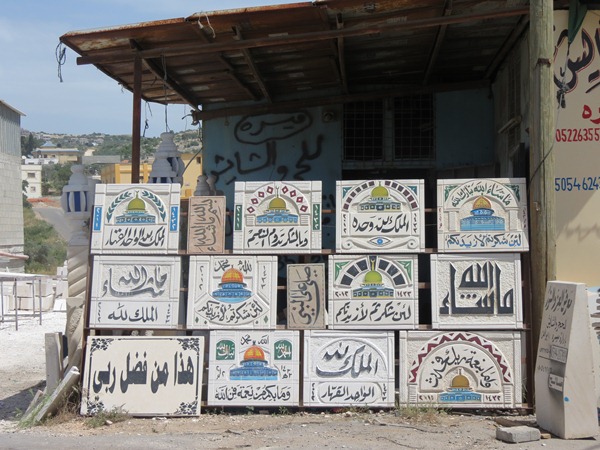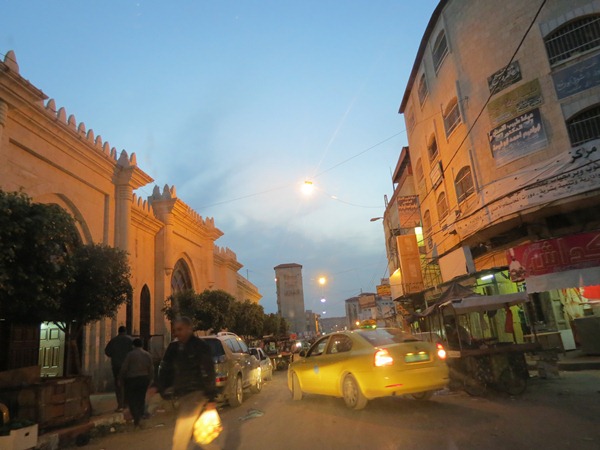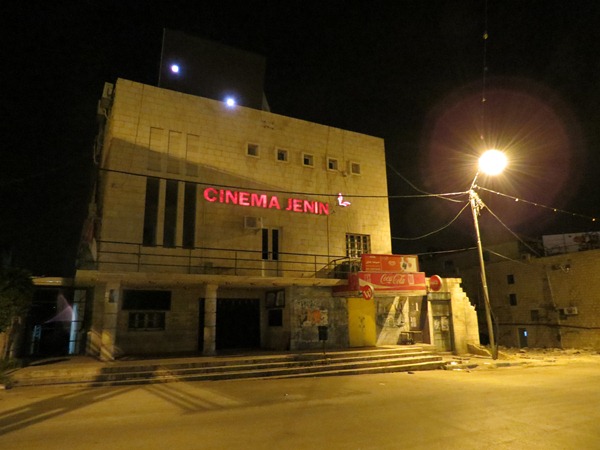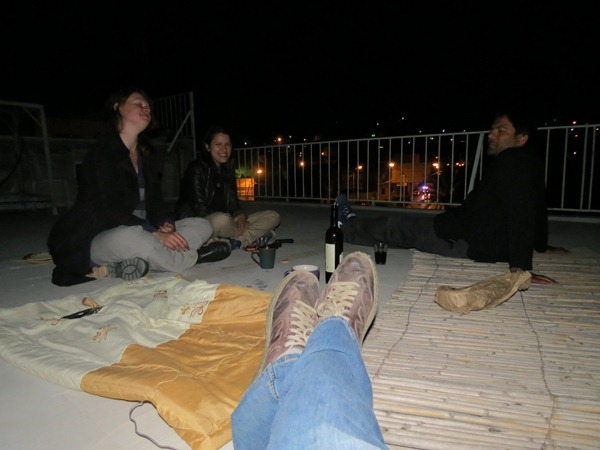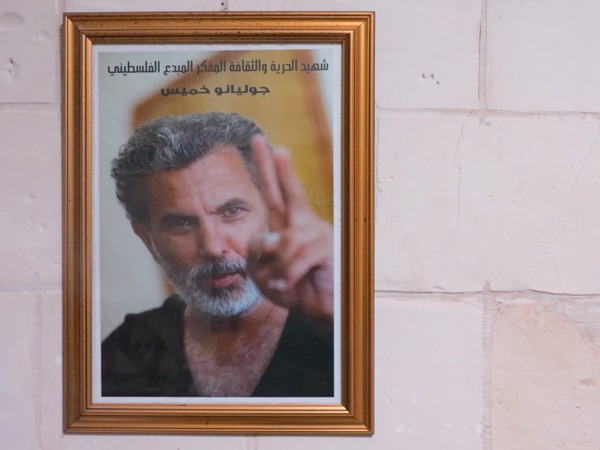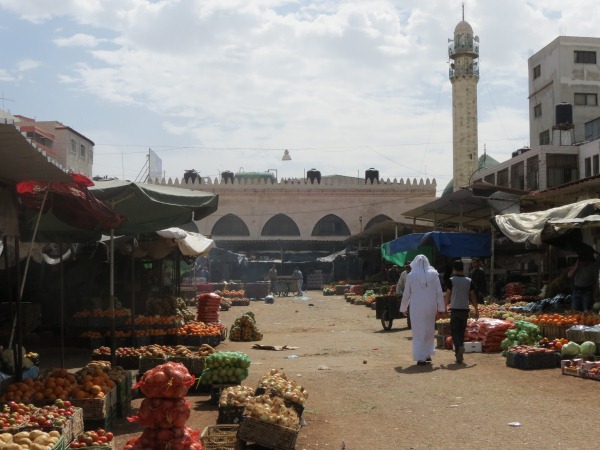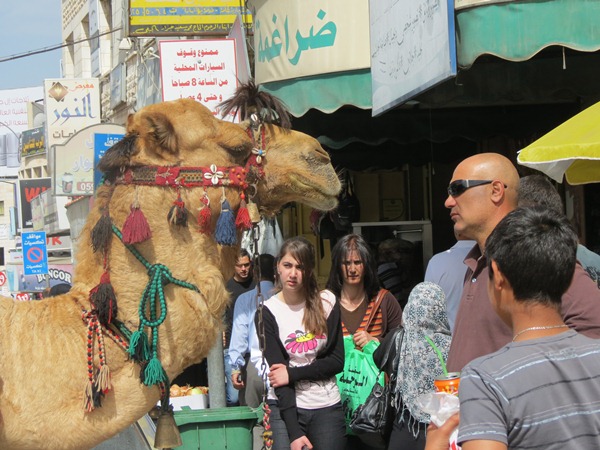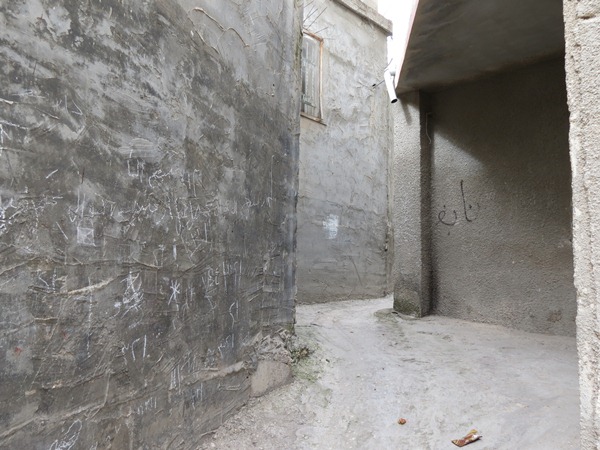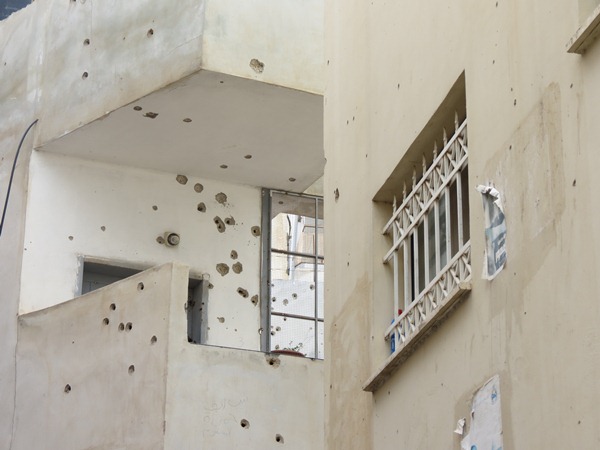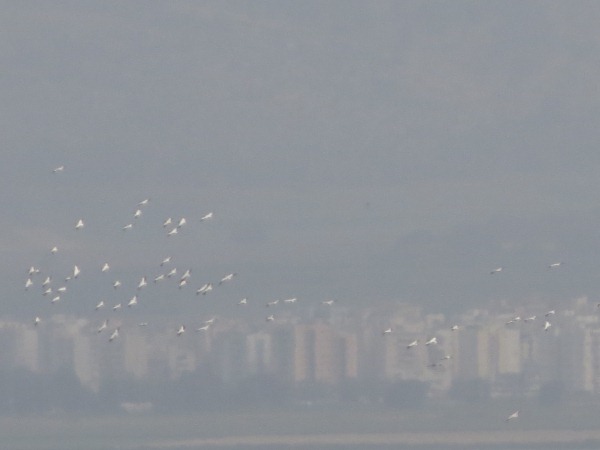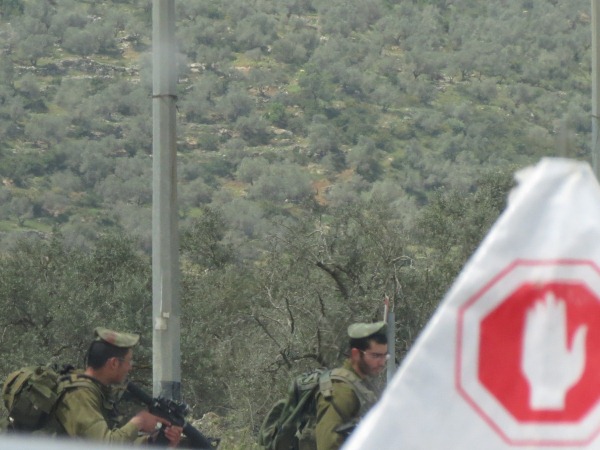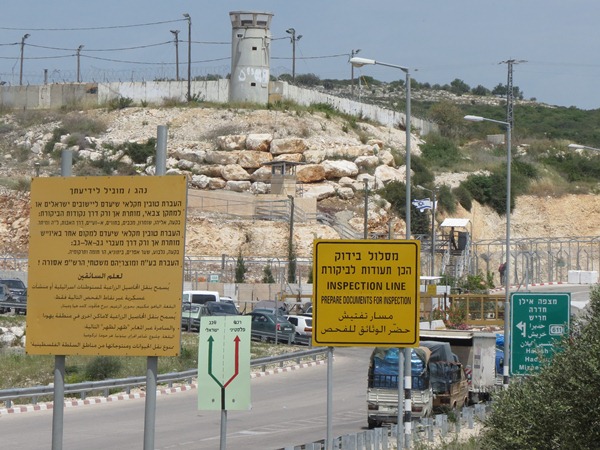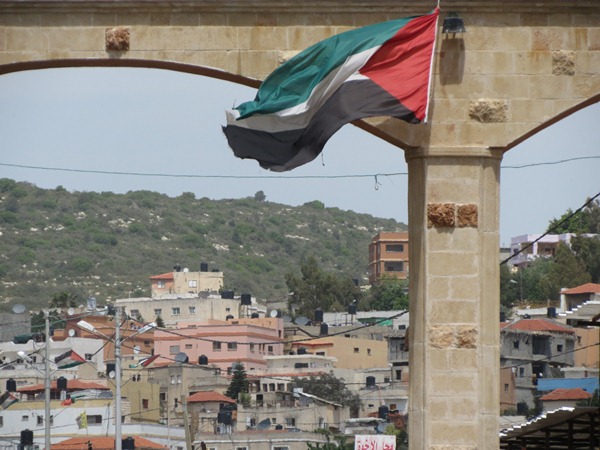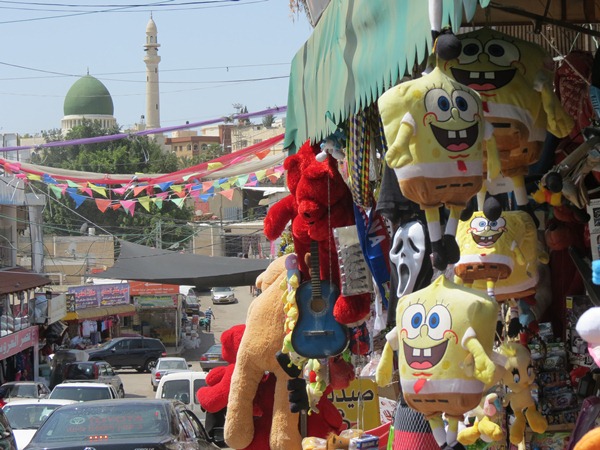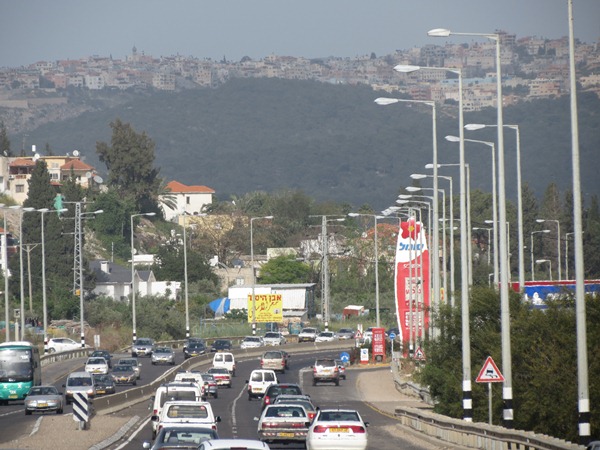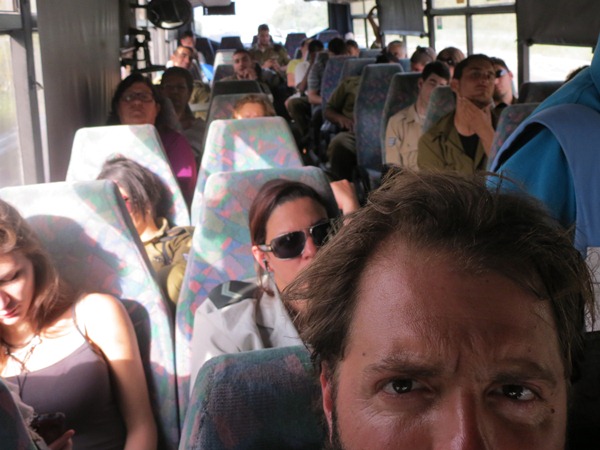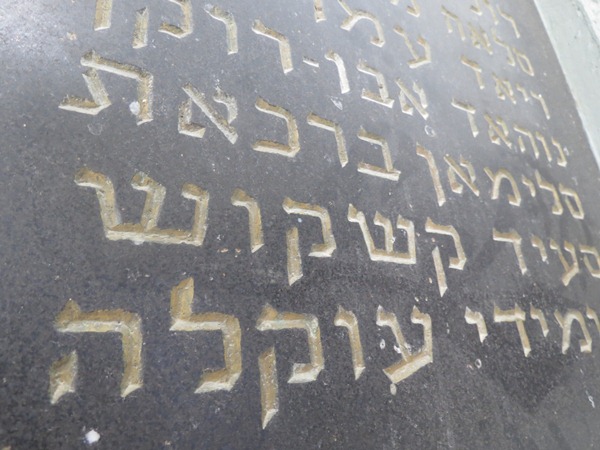From Jenin to Mishmar Hagvul junction via a rat maze and a divided town. This is no country for the paranoid.
Come twilight, the driver and I arrive in the city of Jenin.
He drops me off by a hotel in the middle of Jenin’s market area. It’s about as basic as a gas station’s toilets, but I’ll be glad to sleep in some gas station’s toilets tonight, so long as no one asks me for ID.
The hotel warden does ask for my passport. I say that I left it in Ramallah and must head there first thing in the morning. He eventually surrenders and hands me the guest registry. I sign in as Gregory Richardson, with a made-up British passport number and slightly skewed birth date (one can never be too safe).
I soon head out, careful to stay away from uniformed policemen and hoping not to awaken the curiousity of plain-clothed ones (“muhabarat”). This is Area A, and if I’m caught here, a very long and possibly damaging ordeal will follow. I used up all my favors in Dura on the September Journey (where I also explain the concept of “areas”). My margin of error is gone.
Enough of that, though. Adrenaline is a fine drug, and this is a pretty, albeit certainly dirty town to stroll through. As I wander around, street-vendor kebab in hand, I stumble into what looks like an interesting spot. Cinema Jenin.
Behind the cinema is a pretty garden with an Argileh cafe, full of English chatter. I was expecting to be very lonely in this city, but destiny provided fellow travelers. Soon I step over and present myself to Ifran from Norway and Kathryn from Germany.
Neither is really a traveler. Ifran is serving as an observer in a small village in the Jordan valley, from which he also blogs. Kathryn volunteers with youths in Jenin itself. Soon we are joined by Rebecca, a German sound technician, who on a previous visit installed the cinema’s sound system.
The cinema’s renovation was conceived by German filmmaker Marcus Vetter in 2009 and the sound system donated by Pink Floyd’s own Roger Waters. According to Kathryn, audiences are currently thin and the film selection disappointing, but the place is still very lovely, and I am comfortable enough in this environment to gingerly come out of the closet as an Israeli.
There’s a bottle of wine back in my hotel room which I intended to give Danielle, then forgot it in my bag and carried it all over the Bedouin wilderness to this mercilessly dry town. I bring this up with the happy bunch and they suggest we uncork it on the roof of their guesthouse.
I love the internationals who come to Palestine to do good deeds, and won’t let anyone talk trash about them, not even themselves. Irfan talks about conflict exploiters of various sorts. He says he’s heard that Kabul is now the second biggest party city on earth after Las Vegas. He talks of what he himself does to maintain a sense of profoundness.
Of course Palestine is an “easy” conflict zone, free of child soldiers and cholera. Of course it’s “sexy,” since world media does take an interest. Of course aid dependence is a problem and all too often the outsiders bring a fish and leave the fishing pole at home, but this remains a place that needs help, and so long as we are the reason it needs help, how can we say anything against those who provide it?
We do, anyway. Israelis feel betrayed by a world that stopped sending us blond kibbutz volunteers and began to send criticism and support for those we imprison. As we speak, a Danish national is getting stitched in the lips after being severly beaten up by an IDF Lieutenant colonel who rammed his M-16 in the young man’s face. The Dane was participating in a peaceful protest bike ride, the Lt. Col was taking part in an occupation, if both are hypocrites, I forgive the former.
A picture hanging in the guesthouse’s foyer commemorates a local who also tried to bring change. Juliano Mer Hamis, half Israeli, half Palestinian, creator of the Freedom Theater, which provided hope for the children of the Jenin refugee camp. One year ago he became the victim of a cold-blooded assassination, when a masked Palestinian gunman shot him in front of the theatre. This is no country for the good-hearted.
In the morning I wake up to Jenin’s rustic market.
Beyond it is the bustle of the modern city. It is human-sized and fun to explore.
I decide not to visit the Freedom Theatre, for fear of being a “conflict tourist,” but somehow my feet do take me to the refugee camp. Like other camps, it has turned over the decades into a dense, DIY slum, where in some places the entire environment is made up of pure concrete.
This camp has much harsher history than others. On April 2, 2002, IDF forces entered it, prepared to stomp out all resistance. An order came to demolish every house where militants might be present, and at least one neighborhood was entirely flattened. Differing accounts on the extremely violent events and high death toll have not yet been reconciled, but all the eye needs do is look.
In one alleyway, an old woman points to the photo of her martyred son, Fadi, which hangs above her doorway. In the photo, Fadi is holding a machine gun. He may have been killed by a close relative of mine who fought here. He may have killed. This is no country for young men. I avoid asking questions and go on to the top of the hill to catch some air.
From here, Afula is visible, so peaceful and mundane, with migrating storks flying all around it.
I should start thinking of getting back to that side of the line. The fence is solid around these parts and the checkpoint separating the two cities is dangerous: If I go there, I incriminate myself for having visited Area A. I must find another gate and hope that it is more forgiving. Upon returning downtown, I catch a service minibus heading for Barta’a, a town to the west.
Barta’a is a divided town. Half of it is in Israel proper, the other – in the West Bank. Unlike Ghajar, which is similarly split, but lays entirely north of the border fence, effectively inside Lebanon, Barta’a was kept to the west of the fence, effectively within Israel.
Since Barta’aites travel frequently to Jenin, I imagine that public transportation is allowed through rather fluidly. That is embarrassingly naive of me, since my destination is across the fence. Conversation with other passengers reveals that no passage to there is possible without proper travel documents, and that the ordeal is often lengthy.
I decide to jump off at a crossroads before the checkpoint, and seek my luck further south. Before reaching that crossroads, we pass the settlement of Mevo Dotan. There the service must go through a serious checkpoint, complete with a soldier who aims his gun at every vehicle that passes.
I remove my hat, to avoid drawing attention, and gaze at the floor of the minibus. They wave us through. What a miracle! Signs in Hebrew appear around us and the road’s condition improves drastically. This road also services the settlement, which means I am allowed to be here. An impenetrable fence still stands between me and the world, but all should be well soon. I descend at said junction and hitchhike south.
Soon a Palestinian man gives me a lift, but as we zoom past another settlement, Hermesh, I notice concrete cubes on the road and a huge red sign forbidding entry of Israelis. We are reentering Area A.
“Stop!” I plead.
The driver is uncomfortable stopping next to a settlement. Military watchtowers observe the entire road in their eyeless manner, and here they would be particularly observant. This is no country for the paranoid. Having already presented myself as a Brit, I now stutter an improvised explanation: “I immigrated to Israel and received the passport, so they don’t let me go here. I must leave now, but thank you.”
He stops.
If I walk to the settlement and catch a lift from there, all will be well, but the driver, Ali, is too friendly to allow that. “Where do you need to go?” he asks.
“Israel,” I confess, then ask: “How do these settlers go there?”
“By way of Barta’a,” he says, “Hold on, I’ll take you there. The sun is crazy today.”
So he drives me to Barta’a crossing, and thankfully, drops me off some distance from it so the attendants don’t notice me stepping out of a Palestinian car. Still, as I expected, no one is allowed to cross here on foot. Being a pedestrian, I am suspicious and am summoned for a thorough search of my belongings and an interrogation.
It’s quite an interrogation. The attendants ask me what my girlfriend studies and what my sisters do for a living. I pretend to be from Suburban Ramat Gan (Since Tel Avivians are leftists, and leftists are traitors), and say that I entered the area this morning by the same gate after staying the night in Danielle’s mother’s house in nearby Pardes Hanna.
“And your girlfriend doesn’t mind that you stay at the houses of mothers of female friends?”
And all the while, they don’t notice that two incriminating water bottles from Jenin are sticking out of the tight pockets of my backpack, with their labels showing.
This is becoming ridiculous, and what makes it worse is the fact that these aren’t soldiers or Shin Bet agents. The fence crossings have been outsourced to a private security firm. Here the firm’s civilian employees are keeping seven Palestinian men behind bars. I can see them clearly from the bench on which my interrogation takes place. I can also see cages full of attack dogs, their gates facing the gravel road adjoining the fence. This is a place of violence and humiliation, and somebody is making a lot of money from that.
Finally they are convinced that I pose little threat to national security. I am free to go, and go I do, directly to Barta’a town.
Divided towns are haunting. I can never get over it. In the photo below, Spongebob is in Palestine, while the mosque is in Israel. The Green Line itself is a small dirty ditch full of trash. It isn’t even visible from the main street, which goes across it. The residents of eastern Barta’a have permission to visit the west of town, but not to go any further into Israel. They are caught between a fence to the east and an invisible wall to the west.
Upon arriving in west Barta’a. I am home, but I still feel trapped. Something about running though a rat maze just takes all the fun out of the day. Besides, Ali was right, it is very hot. I take more than an hour to chill at a Barta’a cafeteria, before heading down the hills to the massive Tel Aviv-Afula road, over which the city of Umm Al-Fahm looms.
This large Palestinian city is now in Israel, but reactionary political leader and current foreign minister Avigdor Lieberman proposes fixing the lines and disengaging from it. In other words, Lieberman proposes exiling the people of an entire city and its suburbs, along with the city and the suburbs. This is no country for believers in equality and justice.
Here I take a bus, feeling trapped and overheated and nauseous. The bus is full of soldiers and girls in tank tops. It’s as though Israel were an actress hired to play the opposite of Palestine.
I don’t go much further. Soon the Green Line curves to the south and I must follow it. At the junction where the bus drops me off stands a large monument dedicated to fallen policemen of the Border Police.
The Border Police, effectively a branch of the army, to which 18 year olds are recruited, is the occupation. The recruits often belong to the least privileged, least educated classes in society, and are sent to maintain control over civilian populations.
I am disheartened by how many of the names inscribed on marble are Arabic names, such as the ones appearing in this photo below: Nuhad Abu Rukan, Sliman Barkat, Said Kashkush and Numidi Ukla. I assume that they are all Druze, I know that them and their friends: Ethiopians, Mizrachi working class kids and others, were all trapped: trapped in their backgrounds, trapped in the checkpoints like I was, only for days on end, likely trapped in their own hatred and prejudice for the people they were helping occupy. They were trapped in this damned country’s hunger for ugly history, and then, one day, they were freed.
_______________________________________
The Round Trip thus far!
View Larger Map
Thanks for reading and taking part in the adventure. All writing on this site is done voluntarily, so if any of you would like to pitch in directly for my travel expenses, please click here or on the “donate” button at the top of this page to do so. I’m deeply grateful to those who already donated. Thank you so much! This project would be impossible if not for you.
Relive the first two journeys:
The September Journey
The Christmas Journey


